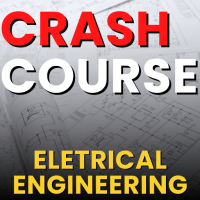Electrical Engineering (EE) Exam > Electrical Engineering (EE) Questions > Maximum torque in dc series motor is limited ...
Start Learning for Free
Maximum torque in dc series motor is limited by
- a)commutation
- b)heating
- c)field control
- d)all of the mentioned
Correct answer is option 'A'. Can you explain this answer?
Verified Answer
Maximum torque in dc series motor is limited bya)commutationb)heatingc...
Commutation is the process which reduces the induced emf and so the torque.
View all questions of this test
Most Upvoted Answer
Maximum torque in dc series motor is limited bya)commutationb)heatingc...
Maximum torque in DC series motor is limited by commutation. The commutation process is responsible for changing the direction of current flow in the armature windings as the rotor rotates. The commutation process is essential to maintain the torque production and efficiency of the DC motor. The following are the reasons why commutation limits the maximum torque in DC series motor:
1. Commutation Effect on Armature Reaction: During commutation, the brushes make contact with the commutator segments, which causes arcing and sparking. These phenomena cause a distortion in the magnetic field produced by the armature windings, known as armature reaction. The armature reaction opposes the field produced by the stator windings, which reduces the torque production of the motor.
2. Commutation Effect on Motor Efficiency: The arcing and sparking during commutation cause energy loss in the form of heat, which reduces the overall efficiency of the motor. The heat generated during commutation can cause damage to the motor's insulation and reduce its lifespan.
3. Commutation Effect on Motor Speed: The commutation process also affects the speed of the motor. The timing of the commutation must be precise to maintain the motor's speed and torque production. If the commutation is not timed correctly, it can cause the motor to slow down or stop.
Therefore, the maximum torque in DC series motor is limited by commutation due to its effect on armature reaction, motor efficiency, and motor speed. To improve the torque production and efficiency of the motor, proper commutation timing and maintenance of the brushes and commutator are necessary.
1. Commutation Effect on Armature Reaction: During commutation, the brushes make contact with the commutator segments, which causes arcing and sparking. These phenomena cause a distortion in the magnetic field produced by the armature windings, known as armature reaction. The armature reaction opposes the field produced by the stator windings, which reduces the torque production of the motor.
2. Commutation Effect on Motor Efficiency: The arcing and sparking during commutation cause energy loss in the form of heat, which reduces the overall efficiency of the motor. The heat generated during commutation can cause damage to the motor's insulation and reduce its lifespan.
3. Commutation Effect on Motor Speed: The commutation process also affects the speed of the motor. The timing of the commutation must be precise to maintain the motor's speed and torque production. If the commutation is not timed correctly, it can cause the motor to slow down or stop.
Therefore, the maximum torque in DC series motor is limited by commutation due to its effect on armature reaction, motor efficiency, and motor speed. To improve the torque production and efficiency of the motor, proper commutation timing and maintenance of the brushes and commutator are necessary.

|
Explore Courses for Electrical Engineering (EE) exam
|

|
Question Description
Maximum torque in dc series motor is limited bya)commutationb)heatingc)field controld)all of the mentionedCorrect answer is option 'A'. Can you explain this answer? for Electrical Engineering (EE) 2025 is part of Electrical Engineering (EE) preparation. The Question and answers have been prepared according to the Electrical Engineering (EE) exam syllabus. Information about Maximum torque in dc series motor is limited bya)commutationb)heatingc)field controld)all of the mentionedCorrect answer is option 'A'. Can you explain this answer? covers all topics & solutions for Electrical Engineering (EE) 2025 Exam. Find important definitions, questions, meanings, examples, exercises and tests below for Maximum torque in dc series motor is limited bya)commutationb)heatingc)field controld)all of the mentionedCorrect answer is option 'A'. Can you explain this answer?.
Maximum torque in dc series motor is limited bya)commutationb)heatingc)field controld)all of the mentionedCorrect answer is option 'A'. Can you explain this answer? for Electrical Engineering (EE) 2025 is part of Electrical Engineering (EE) preparation. The Question and answers have been prepared according to the Electrical Engineering (EE) exam syllabus. Information about Maximum torque in dc series motor is limited bya)commutationb)heatingc)field controld)all of the mentionedCorrect answer is option 'A'. Can you explain this answer? covers all topics & solutions for Electrical Engineering (EE) 2025 Exam. Find important definitions, questions, meanings, examples, exercises and tests below for Maximum torque in dc series motor is limited bya)commutationb)heatingc)field controld)all of the mentionedCorrect answer is option 'A'. Can you explain this answer?.
Solutions for Maximum torque in dc series motor is limited bya)commutationb)heatingc)field controld)all of the mentionedCorrect answer is option 'A'. Can you explain this answer? in English & in Hindi are available as part of our courses for Electrical Engineering (EE).
Download more important topics, notes, lectures and mock test series for Electrical Engineering (EE) Exam by signing up for free.
Here you can find the meaning of Maximum torque in dc series motor is limited bya)commutationb)heatingc)field controld)all of the mentionedCorrect answer is option 'A'. Can you explain this answer? defined & explained in the simplest way possible. Besides giving the explanation of
Maximum torque in dc series motor is limited bya)commutationb)heatingc)field controld)all of the mentionedCorrect answer is option 'A'. Can you explain this answer?, a detailed solution for Maximum torque in dc series motor is limited bya)commutationb)heatingc)field controld)all of the mentionedCorrect answer is option 'A'. Can you explain this answer? has been provided alongside types of Maximum torque in dc series motor is limited bya)commutationb)heatingc)field controld)all of the mentionedCorrect answer is option 'A'. Can you explain this answer? theory, EduRev gives you an
ample number of questions to practice Maximum torque in dc series motor is limited bya)commutationb)heatingc)field controld)all of the mentionedCorrect answer is option 'A'. Can you explain this answer? tests, examples and also practice Electrical Engineering (EE) tests.

|
Explore Courses for Electrical Engineering (EE) exam
|

|
Signup for Free!
Signup to see your scores go up within 7 days! Learn & Practice with 1000+ FREE Notes, Videos & Tests.























